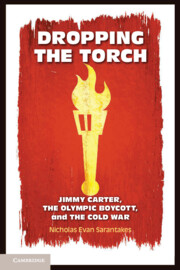Book contents
- Frontmatter
- Contents
- Acknowledgments
- Abbreviations
- Introduction Miracle on Ice
- Chapter 1 Lord Killanin and the Politics of the Olympics
- Chapter 2 Los Angeles versus Moscow
- Chapter 3 Jimmy Carter and U.S.-Soviet Relations
- Chapter 4 The Soviet Invasion of Afghanistan
- Chapter 5 The American Response
- Chapter 6 Easy Victories
- Chapter 7 Painful Losses
- Chapter 8 The White House Games
- Chapter 9 Coca-Cola, NBC, and the Defeat of the Iron Lady
- Chapter 10 The Vote in Colorado
- Chapter 11 Civil Wars
- Chapter 12 Carter versus Killanin
- Chapter 13 Moscow: The Olympics Are the Olympics
- Chapter 14 Los Angeles
- Chapter 15 Conclusion
- Epilogue
- Notes
- Bibliography
- Index
Chapter 13 - Moscow: The Olympics Are the Olympics
Published online by Cambridge University Press: 05 September 2012
- Frontmatter
- Contents
- Acknowledgments
- Abbreviations
- Introduction Miracle on Ice
- Chapter 1 Lord Killanin and the Politics of the Olympics
- Chapter 2 Los Angeles versus Moscow
- Chapter 3 Jimmy Carter and U.S.-Soviet Relations
- Chapter 4 The Soviet Invasion of Afghanistan
- Chapter 5 The American Response
- Chapter 6 Easy Victories
- Chapter 7 Painful Losses
- Chapter 8 The White House Games
- Chapter 9 Coca-Cola, NBC, and the Defeat of the Iron Lady
- Chapter 10 The Vote in Colorado
- Chapter 11 Civil Wars
- Chapter 12 Carter versus Killanin
- Chapter 13 Moscow: The Olympics Are the Olympics
- Chapter 14 Los Angeles
- Chapter 15 Conclusion
- Epilogue
- Notes
- Bibliography
- Index
Summary
The Olympics turned out to be far more resilient than Carter ever imagined. There is no question that the boycott did damage, but the athletic competitions in Moscow themselves were worthy of their Olympic name. No one in Moscow questioned the merit of their achievements or really missed the boycotters. The same could not be said of their rivals in the United States. Despite efforts on the part of the administration to make up for the boycott, the playing careers and sometimes the lives of American athletes became nothing more than dust thrown to the wind.
One of the ways that many observers attempted to measure the success of the boycott was by counting the number of countries going to Moscow and those that were staying away. As simple as this task might sound, there was a good deal of squabbling between the IOC and the White House over the exact numbers. The U.S. government basically asserted that all absent countries were boycotting. The IOC argued that many of these nations were undecided, and that several teams were not going to Moscow because of limited resources rather than an effort to make a political statement. In the end, eighty nations participated in the Moscow Olympics. According to a State Department press release, the boycott had worked: “Those national teams and sports federations not participating in Moscow won 73% (58 out of 80) of all the gold medals won at Montreal by athletes from nations outside the Soviet bloc.” If all medals were included, the number was a little lower, 71 percent. “Perhaps,” a reporter for Time magazine noted, “but the fact is that nations the U.S. says are not boycotting Moscow accounted for 72% of the gold medals and 70% of the total medals in 1976.”
- Type
- Chapter
- Information
- Dropping the TorchJimmy Carter, the Olympic Boycott, and the Cold War, pp. 226 - 243Publisher: Cambridge University PressPrint publication year: 2010



